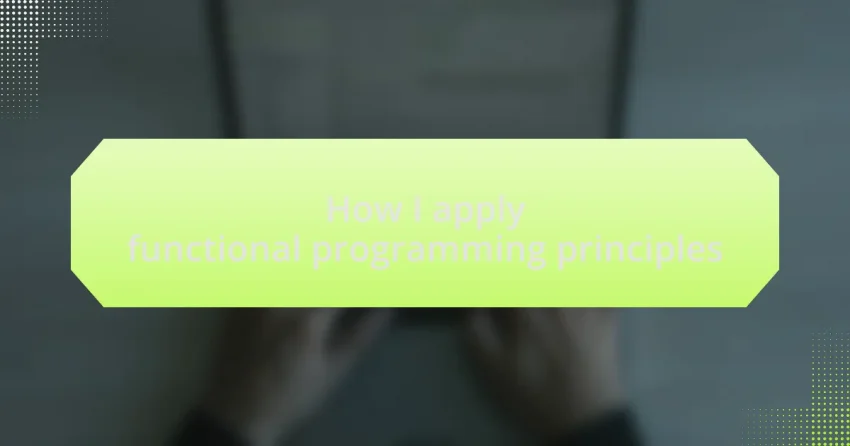Key takeaways:
- Functional programming emphasizes immutability, first-class functions, and pure functions, leading to fewer bugs and clearer code.
- Higher-order functions allow for greater code organization and modularity, enhancing the aesthetics and efficiency of programming.
- Function composition creates seamless workflows, contributing to cleaner code and improved clarity.
- Recursive thinking can simplify problem-solving but may complicate cognitive models, requiring careful consideration in its application.
Author: Lydia Harrington
Bio: Lydia Harrington is an acclaimed author known for her captivating storytelling and rich character development. With a background in literature and a passion for exploring the complexities of human relationships, Lydia’s work spans multiple genres, including contemporary fiction and historical romance. Her debut novel, “Whispers of the Heart,” won the prestigious Bellevue Literary Prize, and her subsequent works have garnered critical acclaim and a loyal readership. When she’s not writing, Lydia enjoys hiking in the mountains and hosting book clubs, where she delights in sharing her love for literature. She currently resides in Portland, Oregon, with her two rescue dogs.
Understanding functional programming principles
Functional programming revolves around treating computation as the evaluation of mathematical functions. One key principle is immutability, which means that once a variable is created, its state cannot change. I remember when I first embraced this concept; it felt liberating to know that my data wouldn’t change unexpectedly, leading to fewer bugs in my code.
Another core principle is first-class functions, where functions can be assigned to variables and passed as arguments. This idea was initially daunting for me—how could functions be objects? However, once I started utilizing higher-order functions, I realized their power in creating more modular and reusable code. Have you ever thought about how simplifying your functions can enhance readability? It certainly transformed my coding practice.
Lastly, let’s talk about pure functions. These functions always produce the same output for the same input, without side effects. I often reflect on the clarity this brings, especially in larger projects. It became so much easier to test and debug my code when I started applying pure functions, fostering a sense of control over complex scenarios. So, how do you feel about incorporating these principles into your own coding journey?
Core concepts of functional programming
One of the foundational concepts in functional programming is higher-order functions. These are functions that can take other functions as arguments or return them as output. I remember the excitement I felt when I first created a function that returned another function—this opened up a whole new world of possibilities for code organization. It was as if I had unlocked a hidden layer of logic that made my work feel elegant and efficient. Have you experienced that moment when your code not only works but feels aesthetically pleasing?
Closely related to higher-order functions is the concept of function composition, where the output of one function becomes the input for another. I still recall the satisfaction of chaining functions together, creating clean and concise workflows. It’s a bit like crafting a well-designed pipeline in a factory: each function does its part, and the whole process flows seamlessly. Isn’t it remarkable how this technique can enhance the clarity of your code?
Another core aspect is recursive thinking. Unlike iterative solutions, recursive functions call themselves to solve problems. I often find recursion to be a double-edged sword—while it can simplify some tasks, it can also lead to daunting mental models. There was a time when I wrestled with a recursive solution that seemed immaculate but spiraled into confusion. Have you ever felt that initial thrill when everything clicks, only to find yourself lost in the depths of your logic? Embracing recursion asks us to rethink our approach, fostering a deeper understanding of problem-solving in a functional manner.
